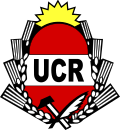Top Qs
Timeline
Chat
Perspective
2003 Buenos Aires City elections
From Wikipedia, the free encyclopedia
Remove ads
General elections were held in the City of Buenos Aires on 24 August 2003 to elect the Chief of Government (mayor) and entirety of the City Legislature. As no mayoral candidate won a majority in the first round, a runoff was held on 14 September 2003, in which incumbent Aníbal Ibarra, of the Broad Front, defeated Mauricio Macri of the Commitment to Change (CpC) coalition to be re-elected as Chief of Government of Buenos Aires.
Remove ads
The entirety of the City Legislature was elected for the last time, and following the election, through a draw it was decided which half of the elected legislators (30 out of 60) would complete a full four year-term, and which half would only serve a two year-term (due to be renewed in the 2005 legislative election).[1]
The elections were due to be held in 2004, but were held earlier in order to unify the national electoral calendar with that of Buenos Aires City, following an agreement between Ibarra and President of Argentina Eduardo Duhalde.[2]
Remove ads
Background
Summarize
Perspective
The 2000 elections in Buenos Aires resulted in the election of progressive former prosecutor Aníbal Ibarra as mayor. With 49.30% of the vote, Ibarra did not win the necessary 50% to win in a single round, and should have gone on to face the second-most voted candidate, former economy minister Domingo Cavallo of Action for the Republic. However, Cavallo dropped off the race shortly after the first round following backlash against his denial of the election's results, which he called "a cheat".[3][4]
Following negotiations between Ibarra and Argentine president Eduardo Duhalde, it was agreed the next general election in the City of Buenos Aires would be held earlier than originally intended, in order to make the city's elections match the national and provincial electoral calendars, since after the return of democracy to Argentina in 1983, no national nor provincial elections were held on even years.[5]
Part of the agreement also meant the entirety of the City Legislature was elected for the last time, and following the election, through a draw it was decided which half of the elected legislators (30 out of 60) would complete a full four year-term, and which half would only serve a two year-term (due to be renewed in the 2005 legislative election).[6]
Remove ads
Candidates
Remove ads
Results
Chief of Government
Legislature
Remove ads
See also
References
External links
Wikiwand - on
Seamless Wikipedia browsing. On steroids.
Remove ads





